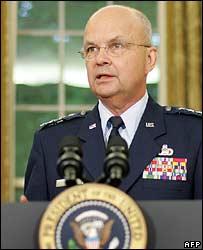CIA blunders outlined in new book
By Tim Shipman in Washington, DC
Last Updated: 12:55am BST 29/07/2007
The CIA thought it had an intelligence coup on its hands in 1994. Its friends in the Guatemalan military were bugging the bedroom of Marilyn McAfee, the American ambassador in that country, whom they regarded as suspect because she was fighting human rights abuses by the regime.
Eavesdroppers heard her whispering sweet nothings to someone whom they took to be her secretary, another female diplomat - and the CIA set out to undermine Mrs McAfee by spreading rumours in Washington that she was a lesbian.
There was just one problem. The ambassador, who was happily married, was not having an affair with her secretary. The secret microphones had instead recorded her "cooing endearments" to Murphy, her poodle.

The mistake is just one example of bungling by the CIA chronicled in a new history of the agency by the Pulitzer prize-winning author, Tim Weiner, who has covered intelligence matters for The New York Times for two decades.
His book draws on 50,000 documents in the CIA's archives, dating back to 1947, the year it was founded, and more than 300 interviews with staff, past and present, including 10 former directors. Weiner concludes that "the most powerful nation in the history of Western civilisation has failed to create a first-rate spy service" - a failure, he argues, that is a danger to American security.
He paints a portrait of a rogue agency which devoted more time to covert action to oust governments than to gathering information about America's enemies,
and which failed to predict every big international event from the outbreak of the Korean War to the fall of the Berlin Wall and the 9/11 attacks.
The book, Legacy of Ashes, has infuriated some former CIA officers who insist that the agency needs support, not denigration. One dismissed Weiner's criticisms as "superficial and unfair".
It details how the CIA relied from the outset on low-level sources and ill-trained officers. In 1953 it sent its first officer to Moscow, but he was so inept that he was seduced by his Russian housemaid - really a KGB colonel - photographed in flagrante and blackmailed.
In eastern Europe in the early days of the Cold War, almost every agent parachuted in was captured and killed. More than $1 million was sent to a fake spy ring set up by Polish intelligence - effectively paying money directly to their enemy.
During the Korean War, none of the CIA's 200 officers in the South Korean capital, Seoul, spoke Korean. In 1952, the CIA station chief concluded that nearly every Korean agent either "invented his reports or worked in secret for the communists".
Things were little better in the battle with America's main Cold War foe, Weiner argues. An internal CIA report in 1956 found that just two of the 20 spies recruited in the Soviet Union had any contact with the government or military. One of its top sources was a Russian vet.
When the Berlin Wall was erected in 1961, among the CIA's best agents in East Berlin were a newspaper salesman and a roofer, who occasionally worked in the Soviet military compound.
Small wonder, Weiner argues, that the CIA concluded that Russia would have 500 intercontinental ballistic missiles "ready to strike" them that year, when the true figure was four. :shock:
For eight years after 1986 the CIA sent reports to Presidents Reagan, Bush and Clinton on the strength of the Soviet military which they knew came largely from sources controlled by Moscow.
The CIA's current difficulties in the Middle East are part of a long and undistinguished history. When Iraq invaded Kuwait in 1990, Robert Gates, then the agency's head and now the American defence secretary, was at a family picnic. A friend of his wife asked him: "What are you doing here?" Mr Gates said: "What are you talking about?" She replied: "The invasion." Mr Gates responded: "What invasion?"
Weiner concludes that even the CIA's apparent successes in covert action proved to be strategic failures. Ousting the Iranian government in 1953 led inexorably to the revolution of 1979. The CIA backed the 1963 Ba'ath Party coup in Iraq which opened the door for Saddam Hussein.
Weiner lays the blame squarely on the shoulders of the CIA's leaders, including some senior officials who have since been revealed as alcoholics, and others who became mentally ill. Allen Dulles, the agency's most celebrated leader, judged the importance of intelligence reports by their weight rather than their contents, a former CIA analyst told Weiner. Frank Wisner, the chief of the CIA's clandestine service in the Fifties was diagnosed with "psychotic mania" and committed to a mental hospital.
The criticisms have enraged some former spies. Pete Bagley, a former CIA chief of Soviet counterintelligence, said: "Weiner's general conclusions are superficial and unfair. I don't remember any CIA misjudgement of Soviet bloc leaders that ever seriously weakened or disoriented American policy, nor do I think that it ever caused the government to lower its guard militarily."
He said that Britain and other European intelligence agencies did no better than the CIA in recruiting top-level sources, and were unable to match the CIA's "first-rate knowledge" from spy planes, satellites and eavesdropping.
Mr Bagley, whose memoirs, Spy Wars, were published earlier this year, urged support for the CIA in its battle against militant Islam, "targets even more difficult than the tight Soviet regime of my time". He said: "I am glad that I don't have to penetrate little groups of fanatic, related, death-seeking zealots."
The CIA has not officially commented on the book.
http://tinyurl.com/2nukp2


